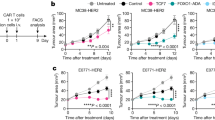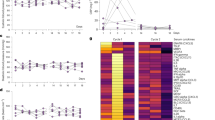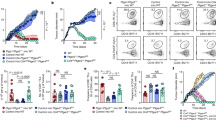Abstract
Immune checkpoint inhibitors (ICI) have transformed the therapeutic landscape in oncology. However, ICI can induce uncommon life-threatening autoimmune T-cell-mediated myotoxicities, including myocarditis and myositis. The thymus plays a critical role in T cell maturation. Here we demonstrate that thymic alterations are associated with increased incidence and severity of ICI myotoxicities. First, using the international pharmacovigilance database VigiBase, the Assistance Publique Hôpitaux de Paris–Sorbonne University data warehouse (Paris, France) and a meta-analysis of clinical trials, we show that ICI treatment of thymic epithelial tumors (TET, and particularly thymoma) was more frequently associated with ICI myotoxicities than other ICI-treated cancers. Second, in an international ICI myocarditis registry, we established that myocarditis occurred earlier after ICI initiation in patients with TET (including active or prior history of TET) compared to other cancers and was more severe in terms of life-threatening arrythmias and concurrent myositis, leading to respiratory muscle failure and death. Lastly, we show that presence of anti-acetylcholine-receptor antibodies (a biological proxy of thymic-associated autoimmunity) was more prevalent in patients with ICI myocarditis than in ICI-treated control patients. Altogether, our results highlight that thymic alterations are associated with incidence and seriousness of ICI myotoxicities. Clinico-radio-biological workup evaluating the thymus may help in predicting ICI myotoxicities.
This is a preview of subscription content, access via your institution
Access options
Access Nature and 54 other Nature Portfolio journals
Get Nature+, our best-value online-access subscription
$29.99 / 30 days
cancel any time
Subscribe to this journal
Receive 12 print issues and online access
$209.00 per year
only $17.42 per issue
Buy this article
- Purchase on Springer Link
- Instant access to full article PDF
Prices may be subject to local taxes which are calculated during checkout



Similar content being viewed by others
Data availability
VigiBase is publicly accessible at https://www.vigiaccess.org/. Access to the ICI myocarditis international REDCap (hosted by Vanderbilt University Medical Center) is possible for contributors after regularization of ethical and contractual considerations among institutions. Clinical datasets used for the biological and radiological sub-studies would be made available upon reasonable request and in compliance with the European General Data Protection Regulation to the corresponding author within 1 month.
Change history
03 January 2024
A Correction to this paper has been published: https://doi.org/10.1038/s41591-023-02771-0
27 November 2023
A Correction to this paper has been published: https://doi.org/10.1038/s41591-023-02690-0
References
Geraud, A. et al. Clinical pharmacology and interplay of immune checkpoint agents: a yin-yang balance. Annu. Rev. Pharmacol. Toxicol. 61, 85–112 (2021).
Nguyen, L. S. et al. Systematic analysis of drug-associated myocarditis reported in the World Health Organization pharmacovigilance database. Nat. Commun. 13, 25 (2022).
Salem, J. E. et al. Cardiovascular toxicities associated with immune checkpoint inhibitors: an observational, retrospective, pharmacovigilance study. Lancet Oncol. 19, 1579–1589 (2018).
Wang, D. Y. et al. Fatal toxic effects associated with immune checkpoint inhibitors: a systematic review and meta-analysis. JAMA Oncol. 4, 1721–1728 (2018).
Power, J. R. et al. Association of early electrical changes with cardiovascular outcomes in immune checkpoint inhibitor myocarditis. Arch. Cardiovasc. Dis. 115, 315–330 (2022).
Champion, S. N. & Stone, J. R. Immune checkpoint inhibitor associated myocarditis occurs in both high-grade and low-grade forms. Mod. Pathol. 33, 99–108 (2020).
Johnson, D. B. et al. Fulminant myocarditis with combination immune checkpoint blockade. N. Engl. J. Med. 375, 1749–1755 (2016).
Axelrod, M. L. et al. T cells specific for α-myosin drive immunotherapy-related myocarditis. Nature 611, 818–826 (2022).
Allenbach, Y. et al. Immune checkpoint inhibitor-induced myositis, the earliest and most lethal complication among rheumatic and musculoskeletal toxicities. Autoimmun. Rev. 19, 102586 (2020).
Anquetil, C. et al. Immune checkpoint inhibitor-associated myositis: expanding the spectrum of cardiac complications of the immunotherapy revolution. Circulation 138, 743–745 (2018).
Salem, J. E. et al. Abatacept for severe immune checkpoint inhibitor-associated myocarditis. N. Engl. J. Med. 380, 2377–2379 (2019).
Shelly, S., Agmon-Levin, N., Altman, A. & Shoenfeld, Y. Thymoma and autoimmunity. Cell. Mol. Immunol. 8, 199–202 (2011).
Nguyen, L. S. et al. Reversal of immune-checkpoint inhibitor fulminant myocarditis using personalized-dose-adjusted abatacept and ruxolitinib: proof of concept. J. Immunother. Cancer 10, e004699 (2022).
Chen, Q. et al. Fatal myocarditis and rhabdomyolysis induced by nivolumab during the treatment of type B3 thymoma. Clin. Toxicol. (Philos.) 56, 667–671 (2018).
Hyun, J. W. et al. Fatal simultaneous multi-organ failure following pembrolizumab treatment for refractory thymoma. Clin. Lung Cancer 21, e74–e77 (2020).
Konstantina, T. et al. Fatal adverse events in two thymoma patients treated with anti-PD-1 immune check point inhibitor and literature review. Lung Cancer 135, 29–32 (2019).
Mammen, A. L. et al. Pre-existing antiacetylcholine receptor autoantibodies and B cell lymphopaenia are associated with the development of myositis in patients with thymoma treated with avelumab, an immune checkpoint inhibitor targeting programmed death-ligand 1. Ann. Rheum. Dis. 78, 150–152 (2019).
Yamamoto, Y. et al. Immunotherapeutic potential of CD4 and CD8 single-positive T cells in thymic epithelial tumors. Sci. Rep. 10, 4064 (2020).
Bihan, K., Lebrun-Vignes, B., Funck-Brentano, C. & Salem, J. E. Uses of pharmacovigilance databases: an overview. Therapie 75, 591–598 (2020).
Power, J. R. et al. Electrocardiographic manifestations of immune checkpoint inhibitor myocarditis. Circulation 144, 1521–1523 (2021).
Lehmann, L. H. et al. Cardiomuscular biomarkers in the diagnosis and prognostication of immune checkpoint inhibitor myocarditis. Circulation 148, 473–486 (2023).
Salem, J. E. et al. Abatacept/ruxolitinib and screening for concomitant respiratory muscle failure to mitigate fatality of immune-checkpoint inhibitor myocarditis. Cancer Discov. 13, 1100–1115 (2023).
Vasbinder, A. et al. Biomarker trends, incidence, and outcomes of immune checkpoint inhibitor–induced myocarditis. JACC CardioOncol. 4, 689–700 (2022).
Dolladille, C. et al. Cardiovascular immunotoxicities associated with immune checkpoint inhibitors: a safety meta-analysis. Eur. Heart J. 42, 4964–4977 (2021).
Ederhy, S. et al. 18F-fluorodeoxyglucose positron emission tomography/computed tomography imaging for the diagnosis of immune checkpoint inhibitor-associated myocarditis. Arch. Cardiovasc. Dis. 115, 114–116 (2022).
Huang, G. Z. & Lo, Y. L. Correlation between acetylcholine receptor antibody levels and thymic pathology in myasthenia gravis: a review. J. Clin. Neuromuscul. Dis. 14, 209–217 (2013).
Lorenzi, A. R. et al. Determination of thymic function directly from peripheral blood: a validated modification to an established method. J. Immunol. Methods 339, 185–194 (2008).
Weksler, B. & Lu, B. Alterations of the immune system in thymic malignancies. J. Thorac. Oncol. 9, S137–S142 (2014).
Fichtner, M. L., Jiang, R., Bourke, A., Nowak, R. J. & O’Connor, K. C. Autoimmune pathology in myasthenia gravis disease subtypes is governed by divergent mechanisms of immunopathology. Front. Immunol. 11, 776 (2020).
Araki, T. et al. Normal thymus in adults: appearance on CT and associations with age, sex, BMI and smoking. Eur. Radiol. 26, 15–24 (2016).
Araki, T., Sholl, L. M., Gerbaudo, V. H., Hatabu, H. & Nishino, M. Imaging characteristics of pathologically proven thymic hyperplasia: identifying features that can differentiate true from lymphoid hyperplasia. AJR Am. J. Roentgenol. 202, 471–478 (2014).
Nasseri, F. & Eftekhari, F. Clinical and radiologic review of the normal and abnormal thymus: pearls and pitfalls. Radiographics 30, 413–428 (2010).
Priola, A. M. et al. Differentiation of rebound and lymphoid thymic hyperplasia from anterior mediastinal tumors with dual-echo chemical-shift MR imaging in adulthood: reliability of the chemical-shift ratio and signal intensity index. Radiology 274, 238–249 (2015).
Simanovsky, N., Hiller, N., Loubashevsky, N. & Rozovsky, K. Normal CT characteristics of the thymus in adults. Eur. J. Radiol. 81, 3581–3586 (2012).
Leiter, A. et al. Metabolic disease and adverse events from immune checkpoint inhibitors. Eur. J. Endocrinol. 184, 857–865 (2021).
Zhang, D. et al. Association between body mass index and immune-related adverse events (irAEs) among advanced-stage cancer patients receiving immune checkpoint inhibitors: a pan-cancer analysis. Cancers (Basel) 13, 6109 (2021).
Lindstrom, J. M., Seybold, M. E., Lennon, V. A., Whittingham, S. & Duane, D. D. Antibody to acetylcholine receptor in myasthenia gravis: prevalence, clinical correlates, and diagnostic value. Neurology 26, 1054–1059 (1976).
Sun, F., Tavella-Burka, S., Li, J. & Li, Y. Positive acetylcholine receptor antibody in nonmyasthenic patients. Muscle Nerve 65, 508–512 (2022).
Kooshesh, K. A., Foy, B. H., Sykes, D. B., Gustafsson, K. & Scadden, D. T. Health consequences of thymus removal in adults. N. Engl. J. Med. 389, 406–417 (2023).
Gil-Cruz, C. et al. Microbiota-derived peptide mimics drive lethal inflammatory cardiomyopathy. Science 366, 881–886 (2019).
Morad, G., Helmink, B. A., Sharma, P. & Wargo, J. A. Hallmarks of response, resistance, and toxicity to immune checkpoint blockade. Cell 184, 5309–5337 (2021).
Lv, H. et al. Impaired thymic tolerance to alpha-myosin directs autoimmunity to the heart in mice and humans. J. Clin. Invest. 121, 1561–1573 (2011).
Won, T. et al. Cardiac myosin-specific autoimmune T cells contribute to immune-checkpoint-inhibitor-associated myocarditis. Cell Rep. 41, 111611 (2022).
Behin, A. & Le Panse, R. New pathways and therapeutic targets in autoimmune myasthenia gravis. J. Neuromuscul. Dis. 5, 265–277 (2018).
Leite, M. I. et al. Myasthenia gravis thymus: complement vulnerability of epithelial and myoid cells, complement attack on them, and correlations with autoantibody status. Am. J. Pathol. 171, 893–905 (2007).
Arbour, K. C. et al. Expression of PD-L1 and other immunotherapeutic targets in thymic epithelial tumors. PLoS ONE 12, e0182665 (2017).
Nowatzke, J. et al. Coronary artery disease and revascularization associated with immune checkpoint blocker myocarditis: report from an international registry. Eur. J. Cancer 177, 197–205 (2022).
Vincent, A. & Newsom Davis, J. Anti-acetylcholine receptor antibodies. J. Neurol. Neurosurg. Psychiatry 43, 590–600 (1980).
Dion, M. L., Sekaly, R. P. & Cheynier, R. Estimating thymic function through quantification of T-cell receptor excision circles. Methods Mol. Biol. 380, 197–213 (2007).
Dion, M. L. et al. HIV infection rapidly induces and maintains a substantial suppression of thymocyte proliferation. Immunity 21, 757–768 (2004).
Acknowledgements
The University of Michigan ICI Biobank was made possible by generous philanthropic support from Mr. John Janitz.
Author information
Authors and Affiliations
Consortia
Contributions
Conception (J.E.S.); Data collection (all); Analysis (C.F., P.G., S.B., B.A., C.D., J.E.S and F.T.); Writing of the first draft (J.E.S.); Editing (all); Funding (J.E.S. and S.S.H.).
Corresponding author
Ethics declarations
Competing interests
None directly related to this work. However, B. Abbar has received consultant or advisory role fees or meeting invitations from Novartis, Astellas, Sanofi, AstraZeneca, Janssen, Merck Sharp & Dohme, Pfizer, IPSEN Pharma and Takeda. J. J. Moslehi is supported by National Institutes of Health grants R01HL141466, R01HL155990, R01HL156021 and R01HL160688 and has served on advisory boards for Pfizer, Novartis, Bristol-Myers Squibb, Takeda, AstraZeneca, Myovant, Kiniksa Pharmaceuticals, BeiGene and Cytokinetics. L.H.L. has served on advisory boards for Daiichi Sankyio, Senaca, AstraZeneca and Servier; has served as an external expert for AstraZeneca; has received speakers’ honoraria from Novartis and Merck Sharp & Dohme; and is receiving grants from the German Center for Cardiovascular Research (DZHK) and the German Research Foundation (DFG) (LE3570/2-1 and 3570/3-1) and grant 01KC2006B from the Federal Ministry for Education and Research (BMBF). J. Cautela has received consultant or advisory role fees or meeting invitations from Novartis, Sanofi, AstraZeneca, Janssen, Merck Sharp & Dohme and Pfizer. F. Tubach is head of the Centre de Pharmacoépidémiologie (Cephepi) of the Assistance Publique Hôpitaux de Paris and of the Clinical Research Unit of Pitié-Salpêtrière Hospital; both of these institutions have received unrestricted research funding and grants for the research projects handled and fees for consultant activities from a large number of pharmaceutical companies that have contributed variously to small parts of the salaries of its employees. F. Tubach is not employed by these institutions and did not receive any personal remuneration from these companies. J. Cadranel has served on advisory boards or as a consultant for Amgen, AstraZeneca, Boehringer Ingelheim, Bristol-Myers Squibb, Novartis, Takeda, Pfizer and Sanofi and has received research funding from AbbVie, Pfizer and Sanofi. D. Johnson has served on advisory boards or as a consultant for Bristol-Myers Squibb, Catalyst Biopharma, Iovance, Janssen, Mallinckrodt, Merck, Mosaic ImmunoEngineering, Novartis, Oncosec, Pfizer, Targovax and Teiko; has received research funding from Bristol-Myers Squibb and Incyte; and has patents pending for the use of MHC-II as a biomarker for ICI response and for abatacept as treatment for immune-related adverse events. T. Similowski reports personal fees for consulting and teaching activities from AstraZeneca France, Chiesi France, KPL Consulting, Lungpacer, OSO-AI, TEVA France and Vitalaire. He is a stock shareholder of startups Hephaï and Austral Dx. J.-E. Salem has participated on advisory boards and been a consultant for or received grants from Bristol-Myers Squibb, Novartis, AstraZeneca, CRC Oncology, EISAI and BeiGene. S.S.H. is supported by National Heart, Lung, and Blood Institute R01HL153384 and National Institute of Diabetes and Digestive and Kidney Diseases R01-DK128012. Y.A. was supported by the ARC Foundation. Other authors have nothing to disclose.
Peer review
Peer review information
Nature Medicine thanks Daniela Cihakova and the other, anonymous, reviewer(s) for their contribution to the peer review of this work. Primary Handling Editors: Ulrike Harjes and Saheli Sadanand, in collaboration with the Nature Medicine team.
Additional information
Publisher’s note Springer Nature remains neutral with regard to jurisdictional claims in published maps and institutional affiliations.
Supplementary information
Supplementary Information
Ten Supplementary Data Files and an appendix with all contributors/institutions of the international ICI myocarditis registry
Rights and permissions
Springer Nature or its licensor (e.g. a society or other partner) holds exclusive rights to this article under a publishing agreement with the author(s) or other rightsholder(s); author self-archiving of the accepted manuscript version of this article is solely governed by the terms of such publishing agreement and applicable law.
About this article
Cite this article
Fenioux, C., Abbar, B., Boussouar, S. et al. Thymus alterations and susceptibility to immune checkpoint inhibitor myocarditis. Nat Med 29, 3100–3110 (2023). https://doi.org/10.1038/s41591-023-02591-2
Received:
Accepted:
Published:
Issue Date:
DOI: https://doi.org/10.1038/s41591-023-02591-2



